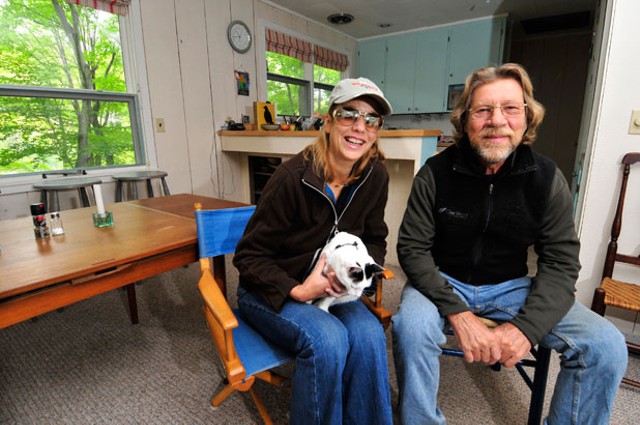Published September 21, 2011 at 7:26 a.m.
Her son’s college diploma and a stack of photos from his recent graduation were all that Pam Mack was able to grab before floodwaters inundated her Waterbury home. The Winooski River rose at a rate faster than anyone in the town could remember, and, before Mack knew it, her rental home on Route 2 held four and a half feet of water. In the family’s backyard, where a shed full of her son’s belongings once stood, there is now a river.
In addition to losing many of the objects that populated their lives — computers, books, family heirlooms, sentimental knickknacks, all of which are now caked in silt — Mack and her 22-year-old son, Joey, were left homeless by the flood. In the days afterward, Mack bunked with her mother, while Joey stayed with friends. But the couch surfing couldn’t last forever. They needed a place to call home, if only temporarily.
On the other side of the Mad River Valley, two homeowners at Mad River Glen began scheming. Sarah Dillard and Betsy Jondro, longtime friends and avid skiers, knew there were plenty of homes in the area that sat empty until the snow fell. What if they could get those second-home owners to open their properties to flood victims?
Dillard reached out to the members of her homeowners’ association, while Jondro traveled around the valley looking for folks in need of housing. Soon they had found 16 homeowners willing to loan their places to people displaced by Irene, and a handful of folks who needed shelter.
Mack was one of those people in need. With the help of Dillard and Jondro, she and her son are now staying in a “beautiful” three-bedroom condo at the Battleground in Waitsfield, Mack says. The unit is owned by Penny Parson, a Mainer with a generous heart.
Three weeks after the flood destroyed or severely damaged more than 700 residences in the state, Gov. Peter Shumlin urged all second-home owners in Vermont to consider offering their properties to flood victims. “We need you now. We need your generosity and your kindness in making these homes available to good, hardworking Vermonters who’ve lost their homes,” the governor (himself a second-home owner) said during an appearance in flood-ravaged Moretown.
Since then, the governor’s office has received calls from 60 owners of vacation homes or condos willing to loan them to flood victims. The office is working with the Federal Emergency Management Agency to place people in homes, says Shumlin’s spokesperson, Sue Allen.
“The governor has been overwhelmed by the response from second-home owners,” Allen says. “It’s a big commitment to offer up one’s home.”
Not surprisingly, given the state’s popularity as a vacation destination, Vermont has a larger-than-average stock of second homes. According to the Vermont Department of Taxes, there are nearly 24,000 “seasonal” residences in the state, though not all secondary properties are listed as seasonal in tax filings. Full-time residential properties number around 196,000.
FEMA is working with second-home owners to vet potential tenants and create rough agreements regarding length of stay, payment (if any), pets and other issues. Foster homes have been sought for scores of animals around the region whose owners are unable to bring them to their temporary homes. Jondro says she’s aware of one woman who has been living in her car because she refuses to be separated from her dog.
Dillard and Jondro didn’t go through official FEMA channels to set people up in second homes, and they are serving only as matchmakers, they say, rather than vetting candidates as the agency is doing. Still, their independent efforts have made an impact. Dillard, a children’s-book author, and Jondro, a retired retail executive who now manages the Mad River Glen ski shop, have placed four families in second homes in the valley.
That’s all for now, Jondro explains, because it’s been difficult to work out issues such as pets and how long people can stay in the donated homes. Also, many of the homes the pair was able to secure weren’t practical for people who lived in Waterbury or Moretown and work even farther afield. Still, thanks to the two women’s efforts, four more families now have safe, secure and dry housing.
“To ask people who have already lost everything to hop around every month, you just can’t,” Jondro says.
Jondro, a second-home owner herself, offered her condo at Mad River Glen to a couple from Moretown whose whole first floor was wiped out. Rebecca Sykes and her husband, Gary Butler, who lived on Route 100B, were “in denial” that the flood would be as bad as it turned out to be, Sykes says. She recalls having a chicken in the oven as the Mad River thrashed down its rocky channel.
“When [the water] came halfway over the floodplain, I knew we were in trouble,” Sykes says.
The water rose so rapidly, the couple only had time to move their cars to higher ground and grab their cats. They spent the night in their respective vehicles, Sykes shivering from hypothermia.
Shortly after the flood, Jondro, who knows Sykes from Mad River Glen, called to check in. Sykes told her their house was underwater. Immediately, Jondro offered up her ski house.
“I’m just fortunate to know her,” Sykes says. “She gave me a key and said, ‘Welcome home.’ It was like heaven. I’m just hoping other people are getting helped out.”
Sykes and Butler don’t have to pay Jondro for the three-bedroom condo, which is usually rented out for $2200 a month during the ski season. The couple has given Jondro money for utilities — enough to carry them through November — but Jondro says it isn’t necessary. They haven’t worked out a formal tenancy agreement; they figure they’ll talk about a long-term plan when the dust has had more time to settle.
Sykes and Butler don’t know exactly when they’re going to be able to move back into their home, though Sykes guesses it will take six months. If that’s the case, Jondro could be out a season’s rent for the condo. The couple says FEMA will give them $700 a month for rent, plus utilities — not enough to cover the cost of Jondro’s unit.
Pam Mack doesn’t anticipate needing to stay in Penny Parson’s home for more than five weeks, which is how long her landlord says it will take to rebuild her rental. Construction has already begun.
For now, Mack has an hourlong drive between her temporary home in Waitsfield and her temporary office in Barre; she works at the Office of Child Support, which was located at the state’s now-flooded Waterbury complex. Despite the commute, she appreciates the rent-free home.
“I’m just in awe of the volunteers, especially what Penny Parson would do — open up her home to strangers,” Mack says. “It’s nice to have a home base that we’re not moving out of every couple days.”
For many second-home owners, the satisfaction of helping provide shelter is equal to the gratitude expressed by flood victims. Colleen Thomas has been the caretaker of a friend’s ski house in Warren for years. Her friend, Rachel Cooke, and Cooke’s husband, Martin, both work in the Foreign Service in Afghanistan and rarely use their getaway home. When the tropical storm hit, Thomas called up Cooke and asked if she could loan out the property. They had only one rental slated for the fall, and there were people in need. “She said ‘Oh, my God, yes,’” Thomas says.
Thomas posted an ad on various relief websites, including the Mad River Valley Facebook page and #VTResponse. Heather Langdon, a mother of three, responded. She had been living with her children on Randall Street in Waterbury, a street besieged by floodwaters, and needed more permanent shelter; since the flood, she had been staying with friends and family. Langdon and Thomas worked out a rent-free deal for the Cookes’ three-bedroom duplex.
“I honestly didn’t really know her,” Thomas says. “But for me — the story she told, the people we had in common — I trusted her.”
Loaning out her friends’ home seemed like the least Thomas could do, she says, especially since she was dealing with a feeling akin to survivor’s guilt. Thomas, who has lived in the valley for 15 years and currently resides in Moretown, was unaffected by Irene.
“When you see something like this, you have to do something,” she says.
Second-home owners interested in loaning out their property to displaced flood victims can make arrangements with FEMA at 1-866-330-5286.
More By This Author
Speaking of...
-

Gov. Scott, Federal Officials Tour Vermont Flood Damage
Jul 12, 2023 -

Heavy Rain, Flooding Hits Vermont — and Rivers Are Rising
Jul 10, 2023 -

Video: How Not to Get Stuck in the Mud in East Barnard with John Leavitt and The Crier
Apr 7, 2022 -

Waterbury to Commemorate and Celebrate, 10 Years After Tropical Storm Irene
Aug 25, 2021 -

What's With the Huge New Drainage Ditches Along Vermont Roads?
Aug 30, 2017 - More »
Comments
Comments are closed.
From 2014-2020, Seven Days allowed readers to comment on all stories posted on our website. While we've appreciated the suggestions and insights, right now Seven Days is prioritizing our core mission — producing high-quality, responsible local journalism — over moderating online debates between readers.
To criticize, correct or praise our reporting, please send us a letter to the editor or send us a tip. We’ll check it out and report the results.
Online comments may return when we have better tech tools for managing them. Thanks for reading.














































